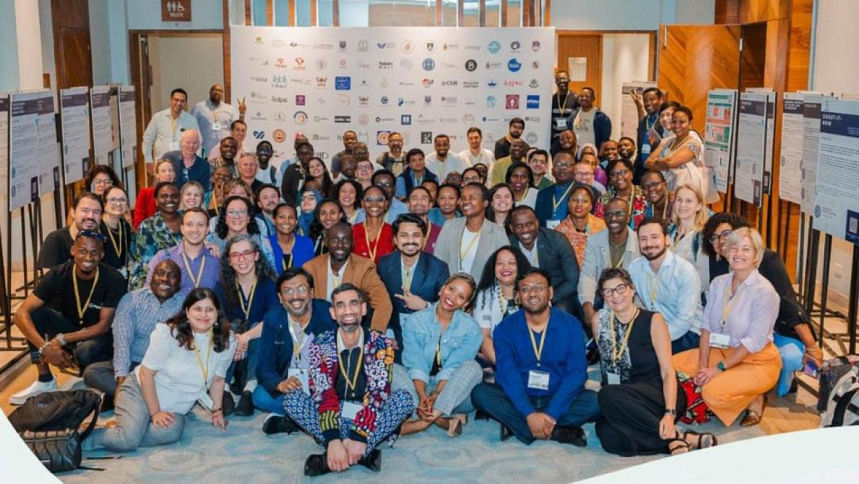Africa’s AI movement and what Bangladesh can learn

For many people, the idea of African nations leading in cutting-edge technology might come as a surprise. The continent has long been associated with challenges like poverty, infrastructure gaps, and political instability. But that narrative is rapidly changing. Across Africa, bold digital transformations, innovative tech startups, and groundbreaking AI initiatives are rewriting the script and leading in cutting-edge technology. Several African countries are now emerging as examples for the rest of the world to look for inspiration.
In the first week of April 2025, I had the privilege of witnessing this transformation firsthand during a visit to Rwanda, a small East African country making giant strides in digital governance and artificial intelligence. I was there to participate in two major international events that not only expanded my perspective but also left me thinking deeply about what Bangladesh can and should do in this space.
On April 2, I attended AI4Health, a global initiative led by the Bill & Melinda Gates Foundation. I was fortunate to be one of 100 innovators selected from 75 countries for my project, Susastho.AI — a Bangla medical GPT that uses generative AI to improve healthcare accessibility for underserved communities in Bangladesh. Beyond receiving a grant, the event created a rare space for collaboration, bringing together healthcare and AI innovators from around the world who are working to make healthcare fairer, smarter, and more inclusive, especially in low and middle-income countries like ours.
The next two days took me to GAISA 2025 (Global AI Summit on Africa), the largest AI event on the continent. It brought together over 2,000 policymakers, researchers, tech leaders, and entrepreneurs from 97 countries. The energy was infectious, with big names like Eric Schmidt (Former CEO of Google), Dr. James Manyika (Senior Vice President at Google-Alphabet), Dr. Joy Buolamwini (MIT Media Lab), and African heads of government sharing their vision for how AI can drive sustainable development and address pressing local challenges.
The opening session set the tone for the summit, featuring none other than Bill Gates alongside Africa's top political leaders. What struck me most was Rwanda's President Paul Kagame, who spoke with clarity and ambition about his country's digital strategy. Under his leadership, Rwanda has invested heavily in AI infrastructure, digital public services, and responsible technology governance — not as a luxury, but as a strategic necessity for national progress. It was a powerful reminder that with the right political will and long-term vision, even a small, landlocked country can aim to become a digital powerhouse.
Unlike many global tech conferences, GAISA was not just about theoretical discussions. It delivered real, actionable outcomes. The summit witnessed the signing of the Africa Declaration on Artificial Intelligence, a continental commitment to ensure AI is developed responsibly, ethically, and inclusively. A landmark announcement was also made: the launch of a $60 billion Africa AI Fund aimed at nurturing startups, building AI infrastructure, creating digital jobs, and expanding research capacity across the continent. In addition, the summit introduced the Africa AI Council and AI for All — a public initiative to engage young people and future innovators from every walk of life.
What impressed me most about Africa's AI strategy is how grounded it is in solving real, local problems. From agriculture to healthcare, education to climate resilience, African innovators are using AI not for prestige, but for practical impact. Rwanda, Kenya, Ghana, and Nigeria have already established AI research hubs and innovation centres. Companies like Cassava Technologies and NVIDIA have built Africa's first AI Factory, Google has opened its AI research centre in Ghana, and Microsoft's Africa Development Centers in Kenya and Nigeria are nurturing the next generation of AI professionals. In every conversation, there was a clear sense that Africa is no longer content to be a passive consumer of global technologies — it wants to shape, build, and lead its digital future.
Meanwhile, Bangladesh has made steady progress in expanding digital services, financial technology, and mobile connectivity. We've seen AI being used in a few sectors like healthcare, agriculture, manufacturing, and finance. But when it comes to building our own AI solutions, driving AI research, or scaling AI startups, we still lag. Much of our AI and digital transformation activity remains fragmented, with limited state-backed initiatives and few globally visible AI products or services originating from Bangladesh. To build 'Bangladesh 2.0', where we can transform from a nation of technology users to a nation of technology creators, we must invest in AI education, foster research and innovation, and empower our youth to develop solutions for our own challenges.
The first step is investing in AI literacy and education at all levels. China started AI education in grade six, and the United States of America followed the same. The UK has made AI and data skills mandatory for all undergraduates. Bangladesh must follow suit. Our schools and colleges need computer labs, coding programs, and accessible public data platforms so that students, regardless of their socio-economic background, can learn and experiment with AI.
Our universities urgently need to be transformed into centres of innovation rather than mere degree factories. Every educator should be trained in six essential areas: AI & Data Science, Leadership, Entrepreneurship, Environment & Sustainability, Transformative Research, and Academic Management. Without preparing our teachers, we cannot expect to produce globally competitive, AI-ready graduates.
I have often said — and continue to believe — that the AI industry will one day surpass the RMG (Ready-Made Garments) sector in Bangladesh in terms of economic contribution. But we must decide whether we are content to remain passive users of AI tools made by others or if we have the ambition to become builders, creators, and leaders in this space. The countries shaping AI today will shape the global economy and geopolitical balance of power tomorrow.
Finally, I urge our policymakers to establish a Centre for Excellence in Artificial Intelligence and Development. This centre will drive AI-powered digital transformation across Bangladesh's public sector, fostering innovation, capacity building, and responsible technology adoption to address national development priorities. It could guide the ethical use of AI, fund applied research, nurture startups, and help position Bangladesh as a credible player in the global digital economy.
What I witnessed in Rwanda was not a fluke. It was the result of bold vision, decisive leadership, and coordinated action. Africa is no longer waiting for permission to lead in technology — and neither should we.

 For all latest news, follow The Daily Star's Google News channel.
For all latest news, follow The Daily Star's Google News channel. 



Comments